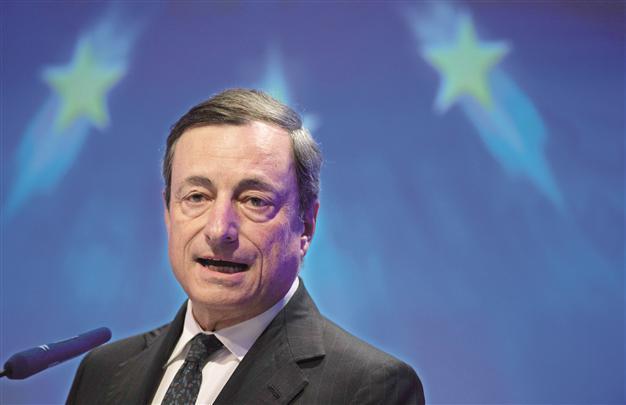European Central Bank ready to act but governments must reform, says President
PARIS / BERLIN

European Central Bank chief Mario Draghi says the bank has been very active in responding to the crisis. AFP photo
The European Central Bank (ECB) is ready to take fresh action when needed but its monetary policy cannot create real economic growth, which governments need to support with reforms, ECB President Mario Draghi said yesterday.
“In short, the ECB has been very active in responding to the crisis,” Draghi told committees in the French lower house of parliament. “And we stand ready to act again when needed.”
Draghi’s comments reinforced his message on Tuesday, when he tried to douse expectations that the ECB could unwind its crisis-fighting policies after the U.S. Federal Reserve last week set out a plan to slow its bond-buying stimulus.
But Draghi said the ECB could only do so much.
“The ECB has done as much as it can to stabilise markets and support the economy,” he said. “Now governments and parliaments need to do all they can to raise growth potential.”
“Monetary policy cannot create real economic growth,” he added. “If growth is stalling because the economy is not producing enough or because firms have lost competitiveness, this is beyond the power of the central bank to fix.”
Draghi pressed governments to do more to support growth by passing reforms.
“These include reducing barriers to entry for new firms and young people, and removing burdens on business like complex tax and labour laws or distortionary regulations,” he said. “Reforms to the labour market are also essential”.
He also pressed governments to push ahead with their plans for a European banking union.
“Banking Union is essential to ensure that we make permanent the progress made in reintegrating financial markets,” he said. “It has two indispensable elements: a strong Single Supervisory Mechanism (SSM) and a strong Single Resolution Mechanism (SRM).”
Draghi defends ECB crisis measuresDraghi defended on June 25 the ECB’s bond-buying program, saying the crisis backstop was more important now following recent market turbulence sparked by other central banks around the world.
Draghi said in a speech in Berlin that the offer to buy bonds issued by indebted countries “is even more essential now as we see potential changes in the monetary policy stance, with associated uncertainty, in other jurisdictions of the global economy.”
The U.S. Federal has roiled markets by indicating it could taper off its emergency stimulus measures next year. The Fed has been buying longer-term bonds in the open market, which drove down long-term interest rates and sent stocks and bonds higher. Chinese authorities have tried to reign in excessive lending, leading to a spike last week in interbank borrowing rates. Japan has also said it will add large monetary stimulus. Draghi did not mention any central bank by name. The ECB hasn’t bought any bonds since announcing its plan last year. But the mere offer has pushed up government bond prices and taken financial pressure off indebted governments by lowering their borrowing costs. The bond-buying help would only be available to countries that sign a bailout agreement with the eurozone’s financial rescue fund and promise in writing to take steps to reduce their debts and deficits.
Germany, where Draghi was speaking Tuesday, is home to some of the ECB president’s biggest critics. Skepticism toward rescue measures for indebted countries is widespread among Germans, who would be the biggest financial backer of any bailout because of the size of their economy. The ECB bond-buying plan is currently being challenged in Germany’s Federal Constitutional Court and was also opposed by Germany’s central bank. Bundesbank head Jens Weidmann says such purchases would risk distributing any losses on purchased bonds to taxpayers in other countries. He has also said they could take pressure of governments to take tough steps to reform their economies and finances.
Compiled from Reuters and AP stories by Daily News staff.
